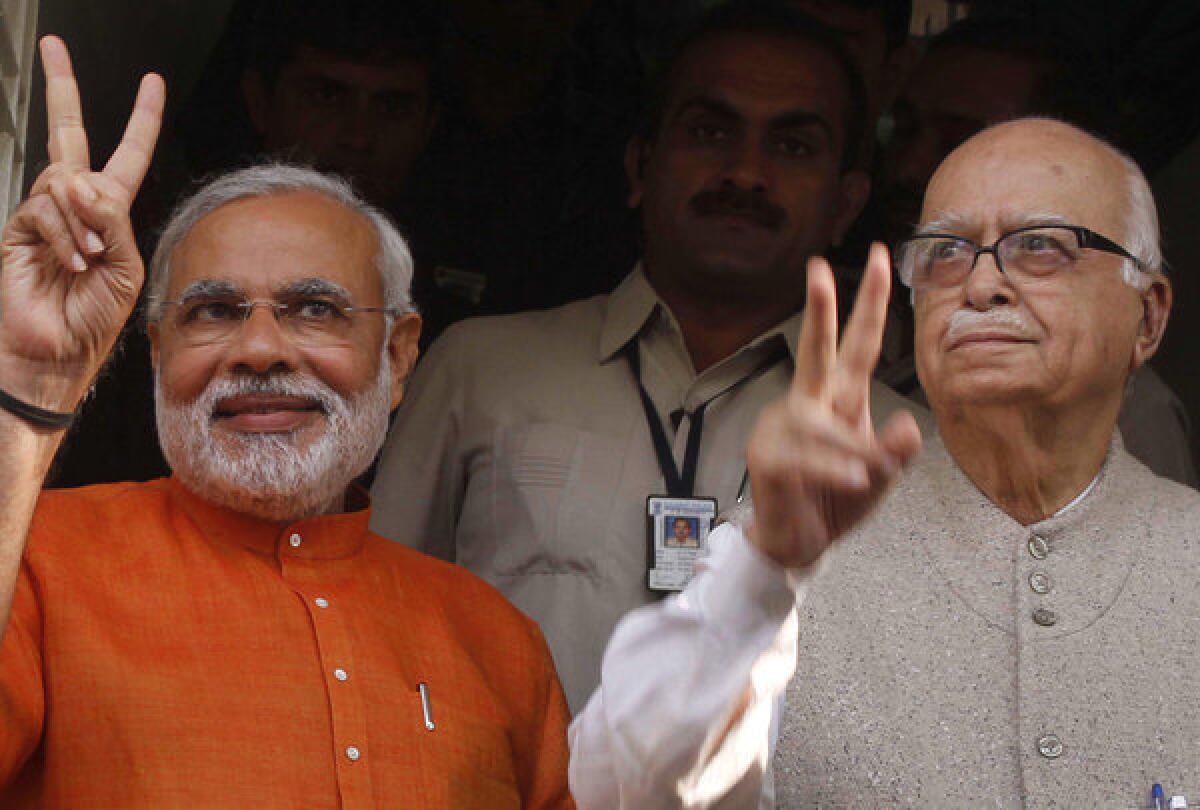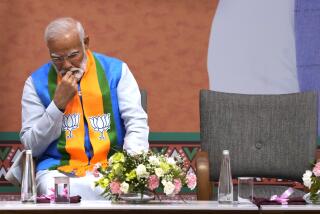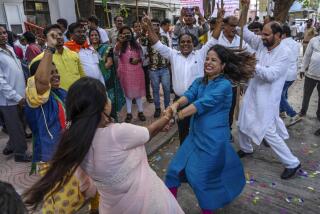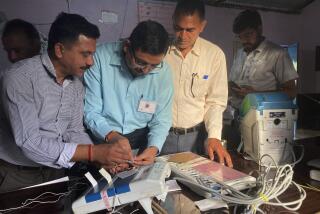Split in opposition party roils Indian politics

- Share via
NEW DELHI – In most countries, the main opposition party would have a free ride to power against a government that’s been sharply criticized for policy malaise, weak leadership and a parade of corruption scandals over a nine-year reign.
That is not the case in India, where divisions within the main opposition Bharatiya Janata Party have prevented it from taking advantage of the perceived weaknesses of the ruling Congress Party.
Those divisions were on display Monday when party stalwart Lal Krishna Advani, 85, quit all party posts in a huff.
This came a day after his principal rival to be the party’s future prime ministerial candidate, controversial western Gujarat state chief minister Narendra Modi, was named chairman of the national election committee, an important post within the Bharatiya Janata Party, or BJP.
“BJP have a lot of housekeeping problems to manage,” said Sankarshan Thakur, a political analyst and roving editor with the Telegraph newspaper, who added that Congress has its own share of internal problems. “ It would be foolish of Congress to afford some glee on the condition of BJP today.”
Advani’s hunger for the top job pre-dates the Bharatiya Janata Party’s last stint in power, from 1998-2004, and the octogenarian party patriarch was quick to make his displeasure known, first by avoiding a key party meeting this weekend, and then with his rather dramatic resignation, the top story of the day.
“The Great Indian Sulk,” read the headline on a column in the Times of India newspaper about Advani’s actions. “The dividing line between a show of strength and an admission of irrelevance is a thin one,” the column said.
Advani’s advanced age isn’t seen as particularly detrimental in a political system where the prime minister is 80 and those who’ve been around a long time often trump upstarts with fresh ideas and reform initiatives.
Adding to the opposition’s strain, the chief minister of northern Bihar state, Nitish Kumar, is likely to pull his Janta Dal (United) party out of the Bharatiya Janata Party-led coalition over his dislike for Modi.
The opposition party’s reluctance to offend its old guard, including Advani, and unify behind a common platform, strategy and leadership structure – a prerequisite, analysts say, for taking on Congress with its dynastic Gandhi legacy -- appeared to finally give ground this weekend with Modi’s anointment.
Modi, 62, has strong support among the party faithful. But some question his appeal with the broader Indian electorate outside of his native Gujarat.
Assuming Modi is named to lead the Bharatiya Janata Party in the 2014 election, one of his biggest challenges will be to fight back the ghosts of 2002, when as chief minister he was accused of standing by, even fueling, anti-Muslim riots in Gujarat that killed more than 1,000 people by official estimates. In 2005, the U.S. banned him from entering the United States over alleged religious intolerance. Modi has repeatedly denied any wrongdoing.
Over the past decade, he’s cultivated a reputation in Gujarat as a pro-business leader and a good orator who operates a relatively efficient administration with minimal corruption. His critics, however, counter that his leadership style is autocratic, that he bridles at criticism and holds limited appeal among poor and minority communities.
The ruling Congress-led coalition, meanwhile, has presided over a series of corruption scandals in the coal, telecommunications, sports management, real estate and defense industries, among others, allegedly amounting to tens of billions of dollars. Critics also say it’s balked at economic reforms required to propel India’s economy ahead and provide jobs for hundreds of millions of young people.
While personalities are arguably less important in a parliamentary system than in a presidential system, analysts have made much of the match-up between Modi and the the heir apparent in the Congress Party, Rahul Gandhi, 42, the son of Congress Party President Sonia Gandhi and the scion of three prime ministers since 1947.
Rahul Gandhi, recently named Congress vice president, has faced criticism for not appearing to really want the top job despite his famous name, and for showing limited patience with the gritty work of politicking necessary to win.
With Modi’s ascendency this weekend, however, the gloves between the two sides have come off. In his first comments in his new role, Modi described the Congress-led ruling coalition as a sinking ship and called for a “Congress-free New India.”
Congress Party general secretary Janardan Dwivedi countered that Modi’s appointment signaled the “complete degeneration” of the Bharatiya Janata Party. Playing on an abbreviation of Narendra Modi’s name, NaMo, Congress officials added that a new affliction has hit the opposition, “Namonia,” which if not contained, could affect tourism.
As the two sides slug it out, some analysts expressed hope that India will prosper in spite of its many political uncertainties. “India is a great country,” Thakur said. “The country goes on despite its leaders. I have put my faith in Indians and not the Indian parties.”
ALSO:
Indian state on high alert following deadly Maoist attack
Indian police arrest 3 men in alleged rape of American woman
Indian, Chinese leaders meet in New Delhi, pledge better relations
Mark.Magnier@latimes.com
Tanvi Sharma in the New Delhi bureau contributed to this report.
More to Read
Sign up for Essential California
The most important California stories and recommendations in your inbox every morning.
You may occasionally receive promotional content from the Los Angeles Times.













